I flew on the 3rd and 4th-largest US airlines to see how they're handling the pandemic and the difference was night and day
Thomas Pallini

- United Airlines and Southwest Airlines make up the lower half of the big four US airlines behind American and Delta.
- I flew on both airlines between New York and Orlando to see how the duo was tackling social distancing policies during the pandemic.
- The two each approach social distancing differently with Southwest being more aggressive in its policies than United but both lacked consistency.
United Airlines and Southwest Airlines are the third and fourth-largest airlines in the country, respectively, and the final two airlines that make up the big four in the US. Just like the top two airlines in that group, American Airlines and Delta Air Lines, their social distancing policies and practices couldn't be any more different.
Both carriers boast over 700 aircraft in their fleets and have sizeable domestic and international networks. The main difference between them being that United is a full-service legacy carrier and Southwest is a no-frills low-cost airline.
United said in May that middle seats and certain aisle seats would be blocked but later amended that policy after passengers reported that flights were still going full. The airline now allows aircraft to fill up but allows free changes if a flight is over 70% full while Southwest, which doesn't assign seats, limits bookings by around one-third of a plane's capacity so middle seats can remain empty.
To get a sense of United's and Southwest's social distancing policies are handling the pandemic and rising passenger numbers, I flew between New York and Orlando with two flights on each airline over the course of one day. My journey started on Southwest via Nashville and ended with United to New York via Washington.
Here's what I found.
My journey to Orlando started on Southwest Airlines from the new LaGuardia Airport Terminal B, from where I'd first fly to Nashville.
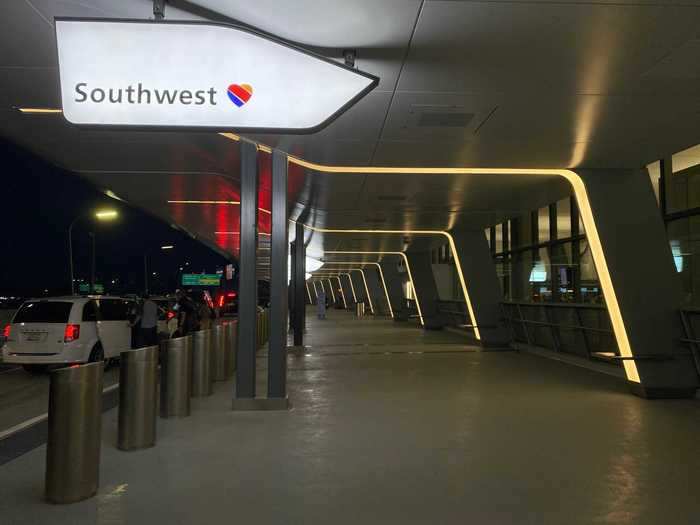
Southwest and LaGuardia Airport both require face coverings so I was masked up from the moment I got to the terminal.
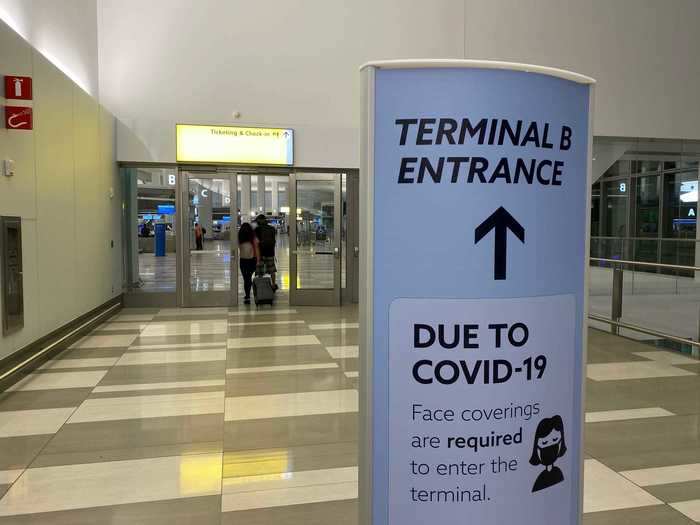
Before I even arrived at the airport, I had to acknowledge this health declaration. A longer version on the website tells passengers "do not travel if you have a fever."
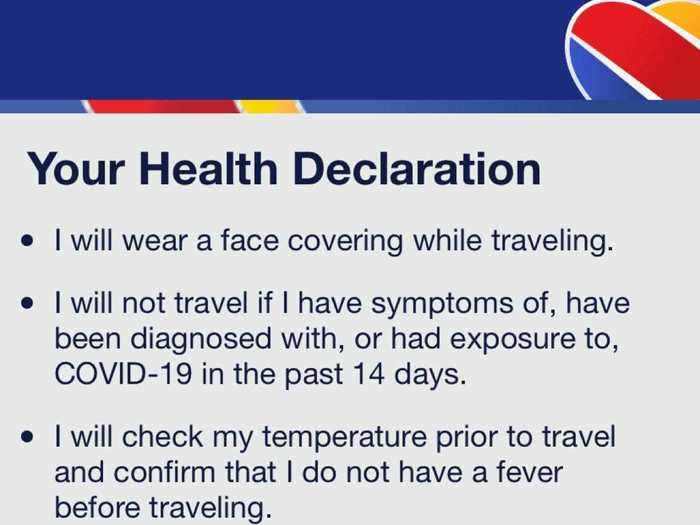
The terminal had just opened less than two weeks prior to this trip and safety features such as plexiglass partitions at check-in and the gates had come standard. Every airline, including United and Southwest, had these partitions.
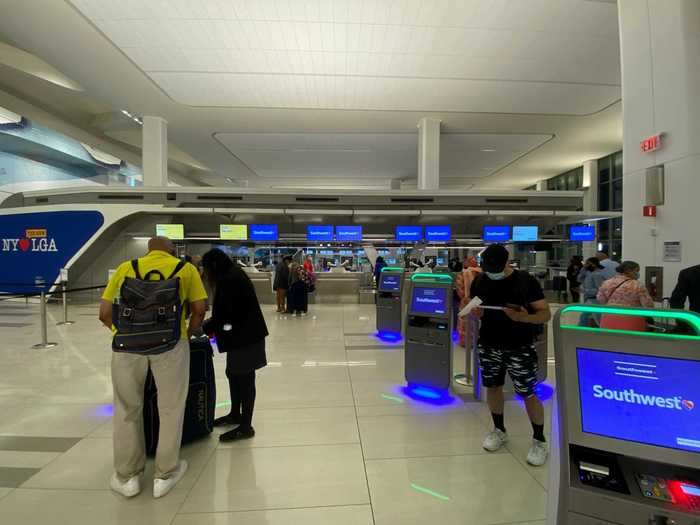
Everything before the gate was up to LaGuardia, not Southwest. So let's go straight to the gate.
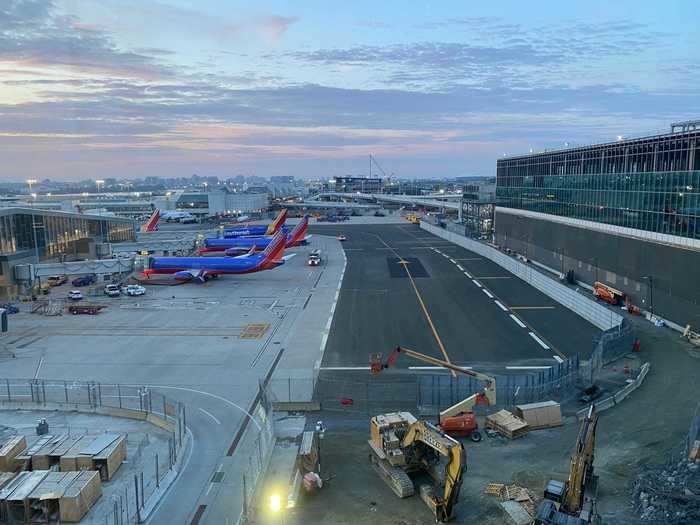
All gates in the terminal also had the standard partitions installed by the airport. Southwest's website says that all of its check-in and gate counters have partitions but I'd have to wait until I landed in Nashville to find out for sure.
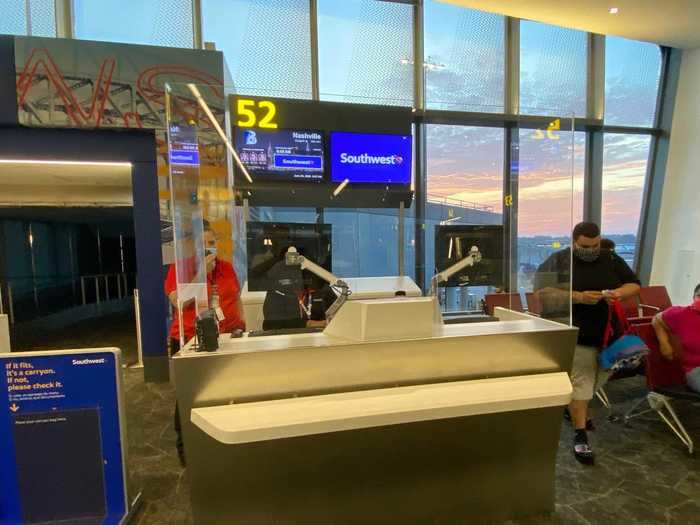
Gate agents made an announcement before boarding about Southwest's social distancing policies but there was no reinforcement from any signage, unlike what I've seen from other airlines. Agents also gave face masks to those who needed.
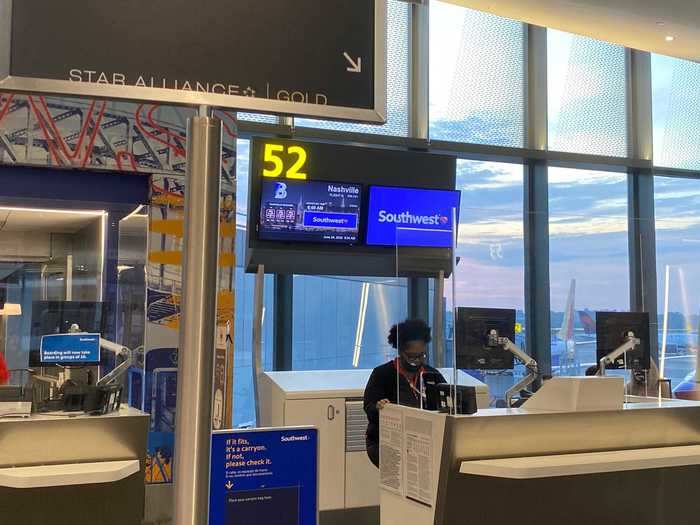
Southwest boards its aircraft by boarding group - A,B, and C - with each person given a number from 1-59 in that group. This requires people in each boarding group to line up, with 30 on each side.
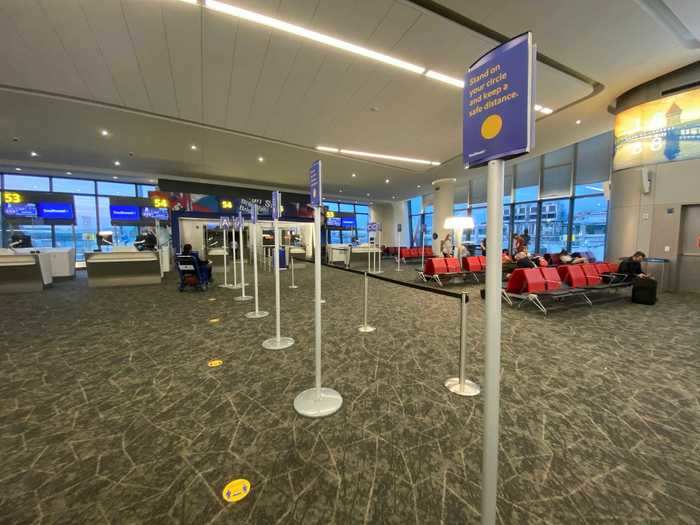
The procedure, however, was modified to only have groups of 10 line up and board at a time, with the rest remaining seated until their group was called.
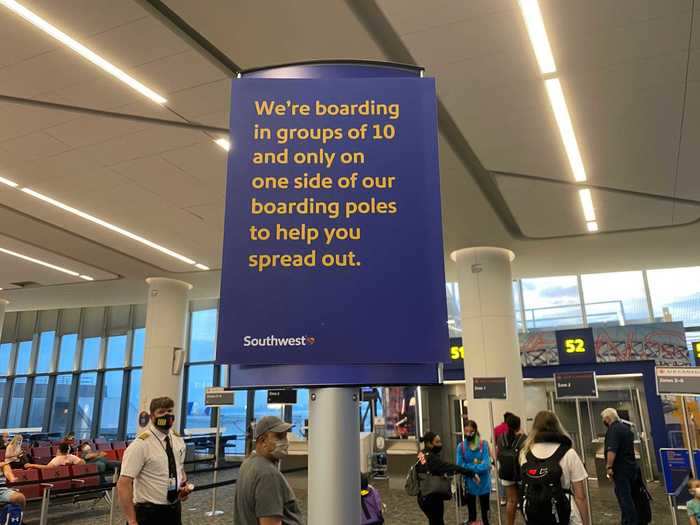
Our gate didn't have that set-up and instead, we boarded by groups of 30.
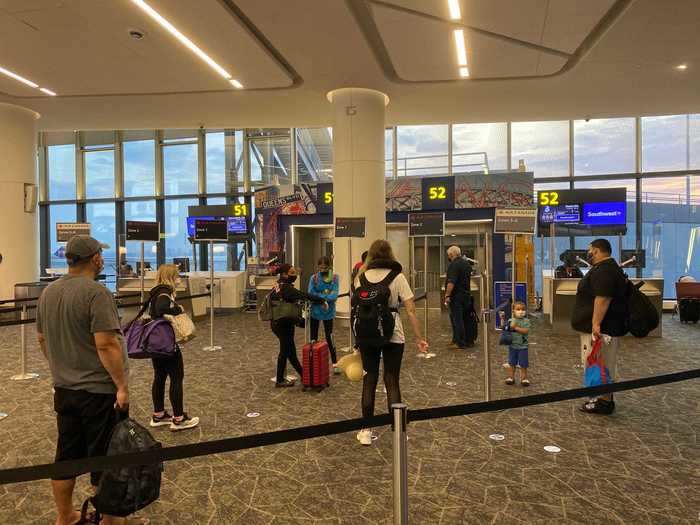
Most gates had these passenger-facing ticket scanners but our flight was boarded with the gate agent manually scanning each ticket with a handheld device.
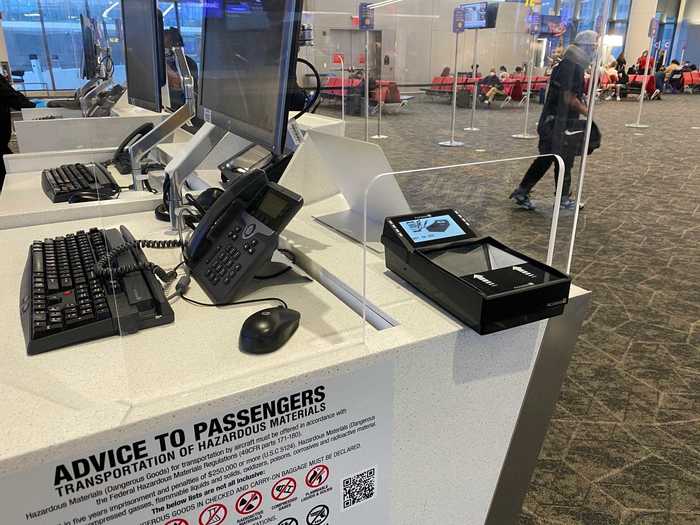
There were also no social distancing reminders in the jetway.
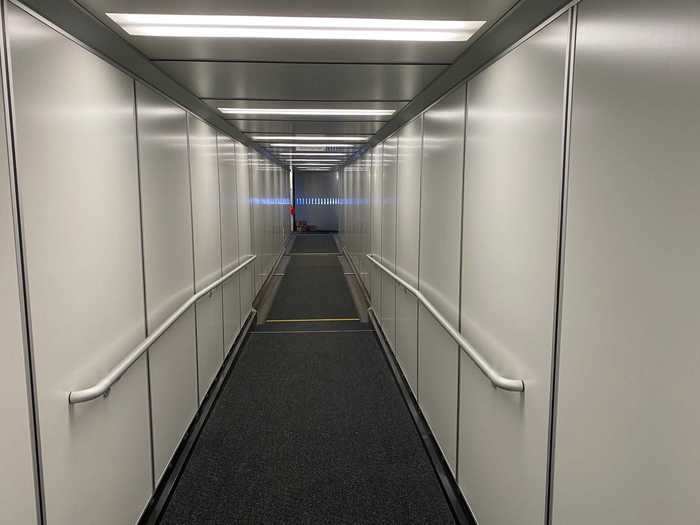
Passengers still board with their assigned number and the front half typically fills up first. Those boarding last have to walk past those who boarded and head to the back.
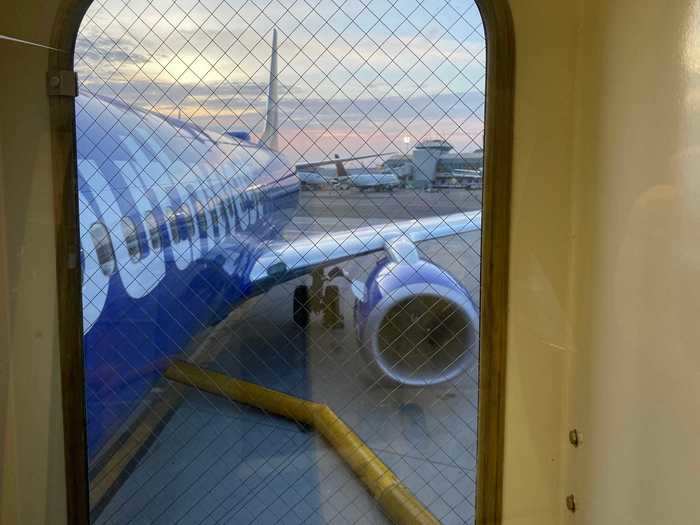
All passengers and flight attendants are also required to wear masks on Southwest.
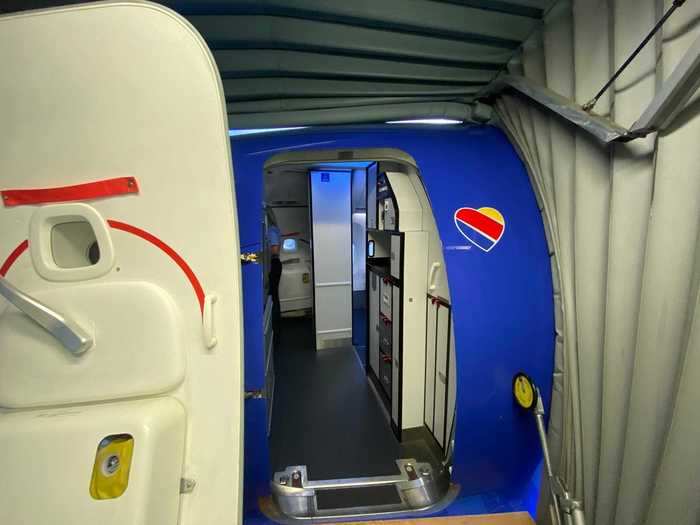
This was the 6:00 a.m. flight so it was understandably empty but less than half the plane's capacity was filled. There were maybe 60 passengers with entire rows left open.
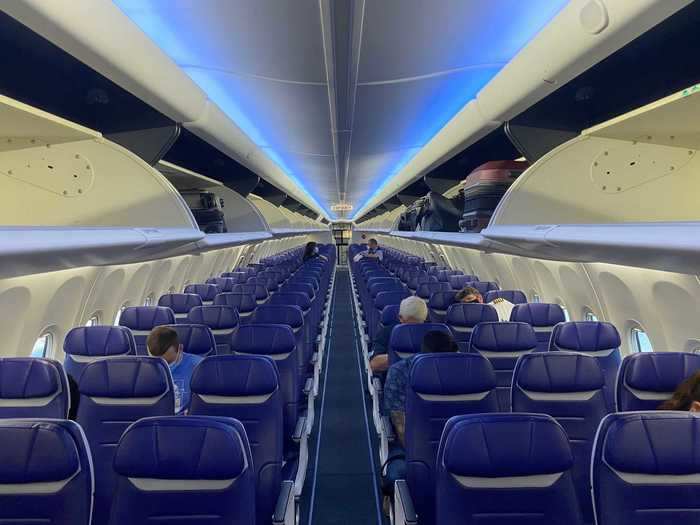
With so few passengers, we didn't have to worry about social distancing but Southwest is limiting bookings by around a third. Only two people can sit in any row with an exception for families.
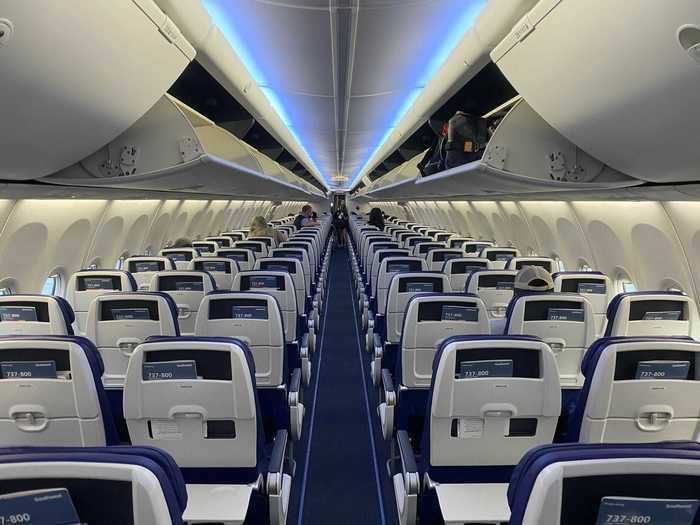
I headed to the back to get the best seat on Southwest, 16A on the 737-800 series aircraft.
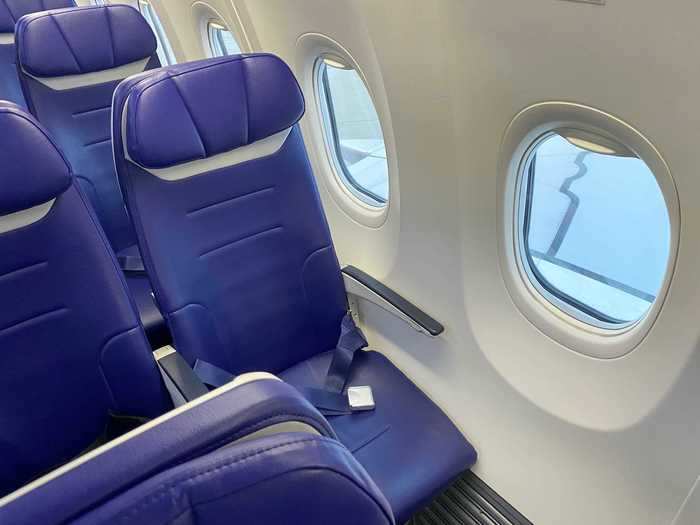
The "Southwest Promise" boasts at least six hours of overnight cleaning and it showed on this flight.
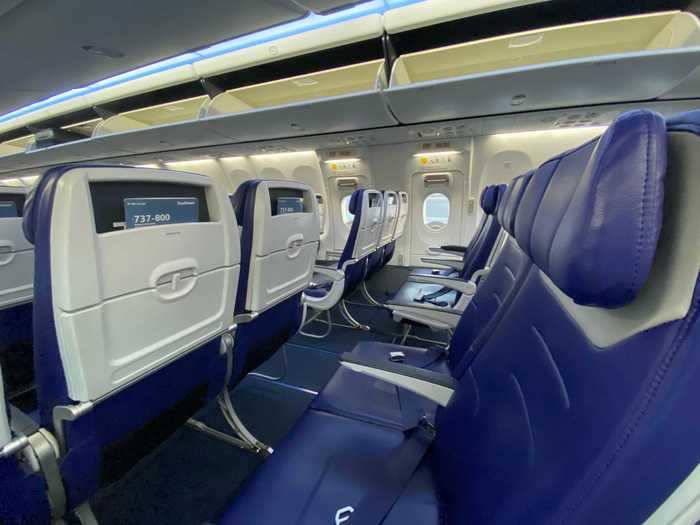
Source: Southwest Airlines
Even my tray table was spotless.
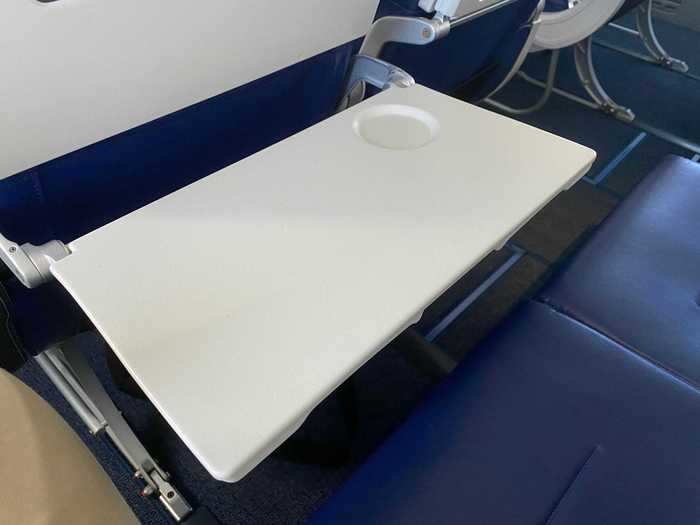
All the in-flight literature besides safety cards had been removed as a precaution. Flight attendants also asked passengers not to store sanitary wipes in the seats as they'd come around after boarding with a trash bag.
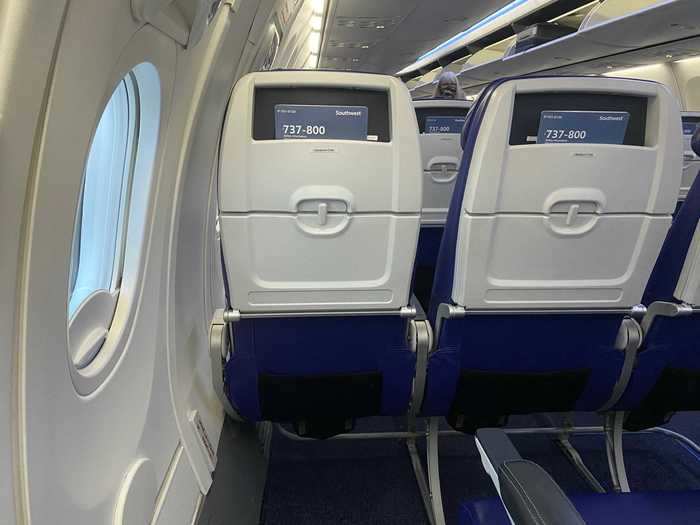
The one downside was that the air vent, which experts say can provide a cone of fresh air for protection, wasn't too strong and I could barely feel the filtered air.

Southwest is limiting in-flight service on flights over 250 miles, which we were luckily over.
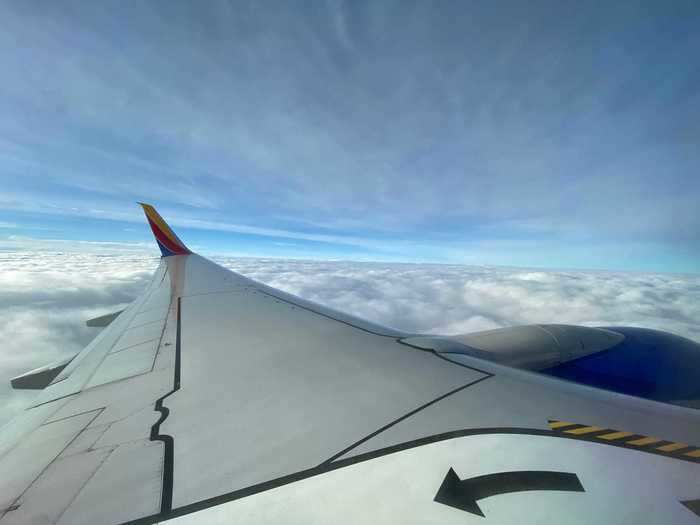
Source: Southwest Airlines
Flight attendants came around with a self-serve bin of Southwest's snack mix — containing pretzels, bread crisps, and Cheez-Itz — and cups of water with ice.
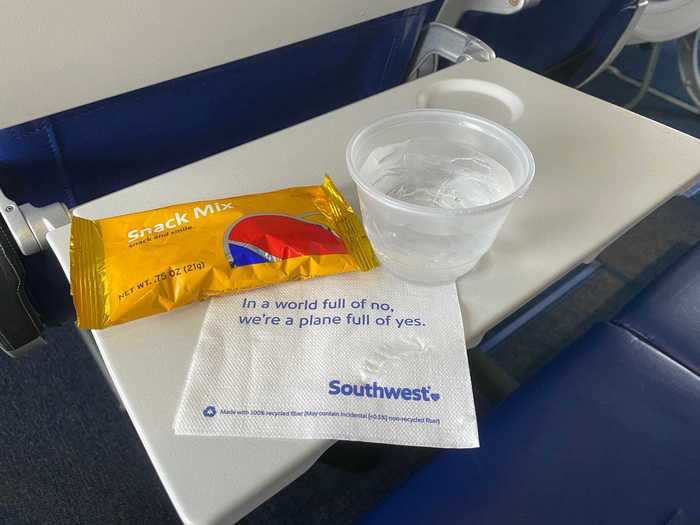
That was the entirety of the service with flight attendants also leaving this tray out in the galley.
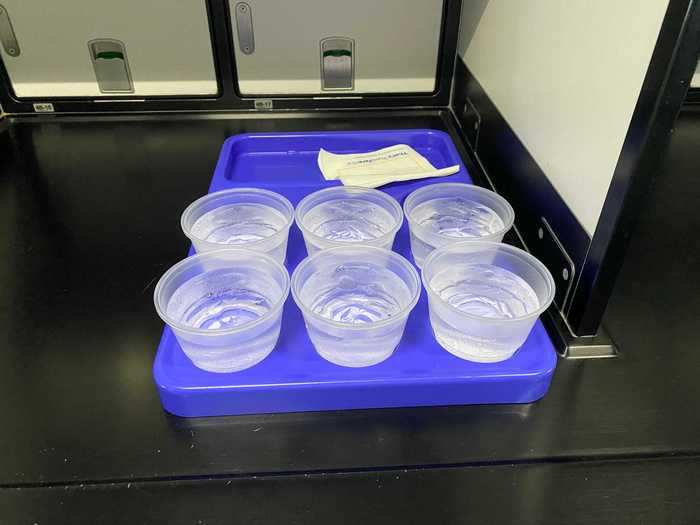
It was smooth sailing down to Nashville but a quiet flight as the crew didn't really interact with passengers after the service.
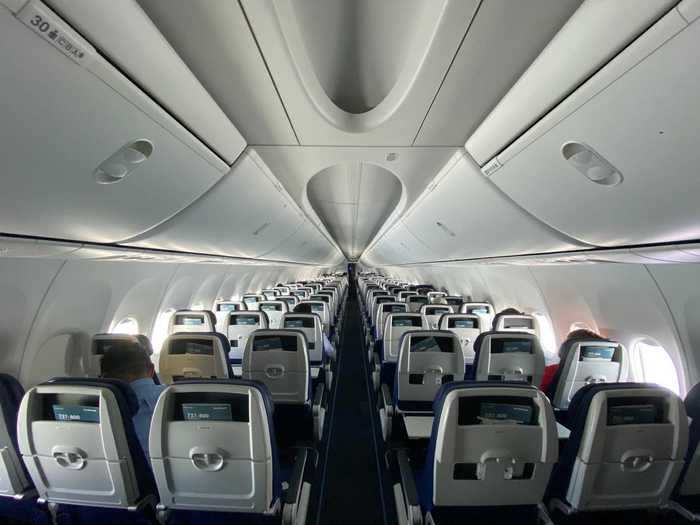
The deplaning process was the same, though, as everybody rushed for the exit.
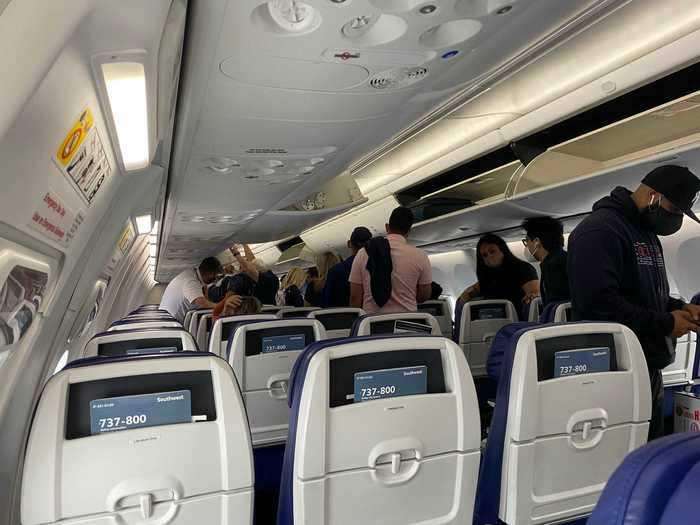
Southwest's cleaning crews had already begun cleaning the aircraft after the flight, wiping down all surfaces including the overhead panel.
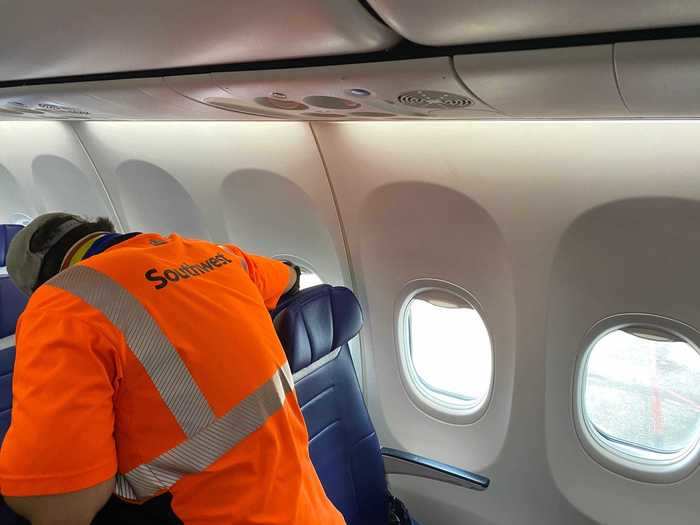
At the gate in Nashville, I saw that Southwest had, in fact, erected partitions at their gates with social distancing reminders.
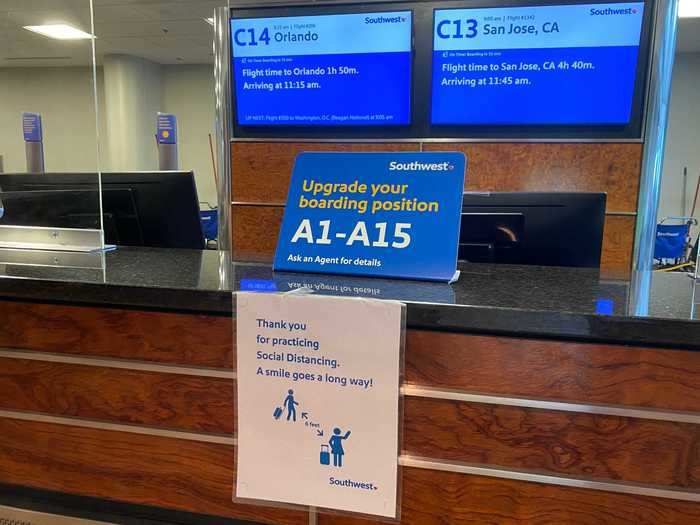
Southwest had placed floor placards in the boarding area, as well.
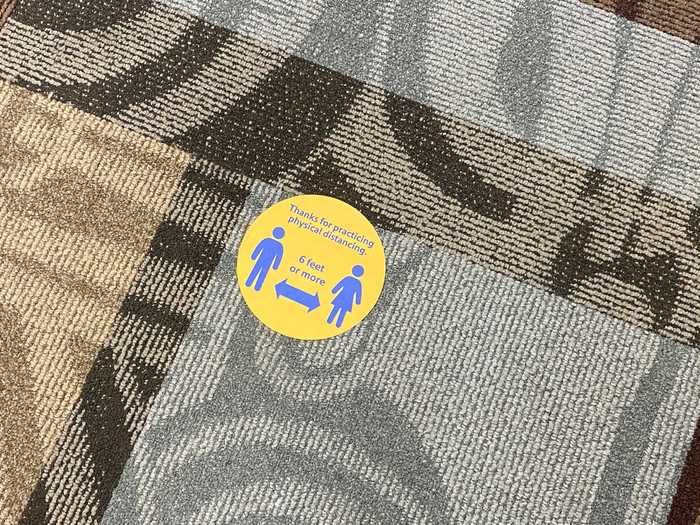
The signage, however, still didn't show any social distancing information, just flight details.
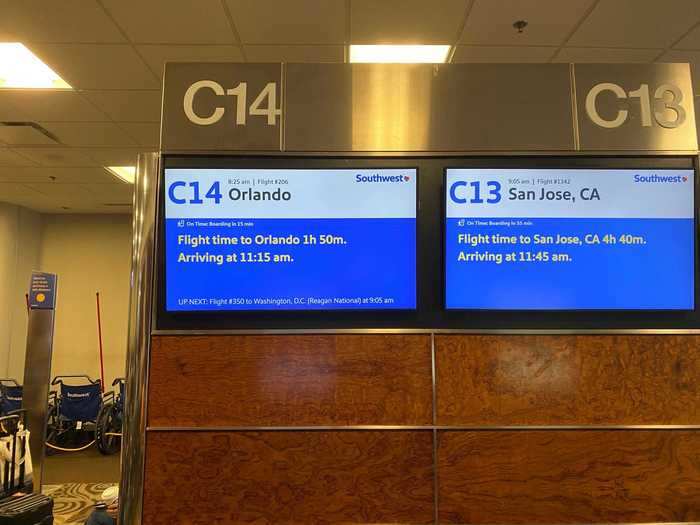
The boarding procedure is Nashville was adapted to the new policy with groups of only 10 being called to line up and board at the same time.
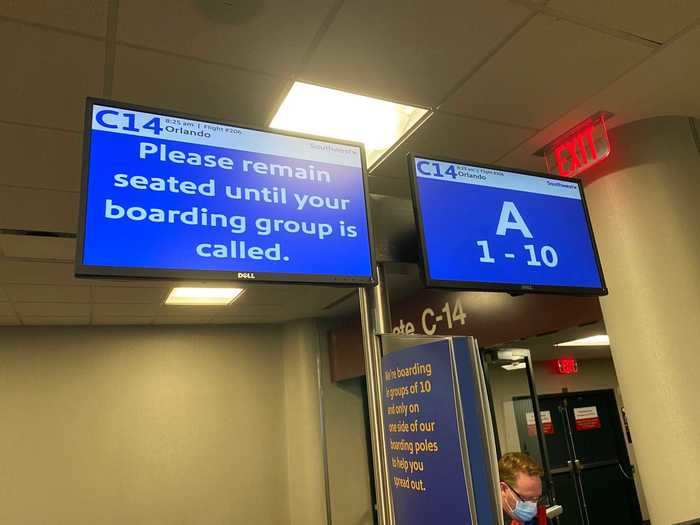
It was clear from the gate area that this was going to be a fuller flight. Face coverings aren't required at Nashville Airport but the Southwest gate agent told passengers that they need to be on when they have their tickets scanned.
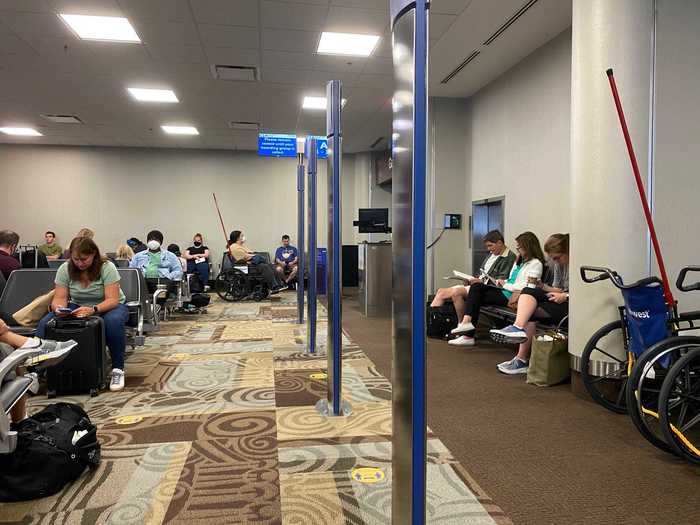
Passengers followed the rule of 10 and distanced at their leisure. Boarding passes were once again scanned by the gate agent.
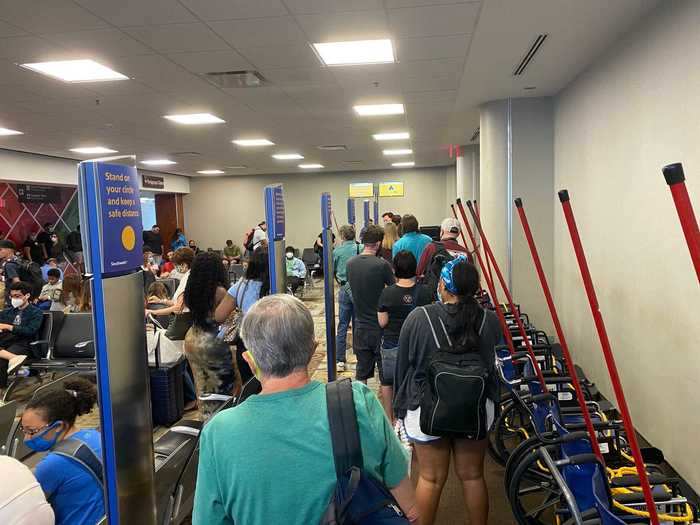
Just like in LaGuardia, there were no placards in the jetway and I noticed the same in Orlando.
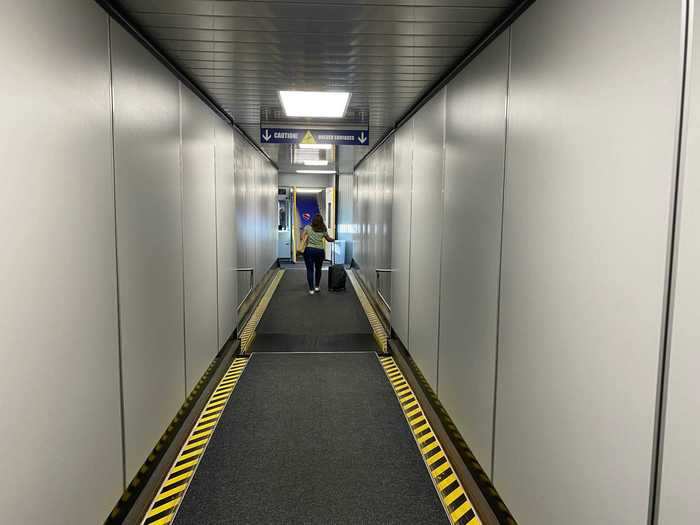
This flight was near to capacity but middle seats were not occupied unless a family was traveling together. Flight attendants continuously made announcements saying that a maximum of two people could sit in each row.
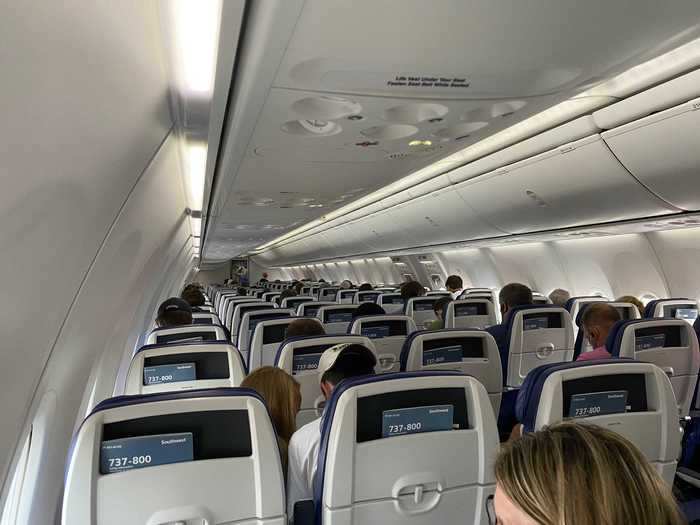
It was smooth sailing down to Orlando with no notable disruptions. Even the seats were as clean as when I got on in New York.
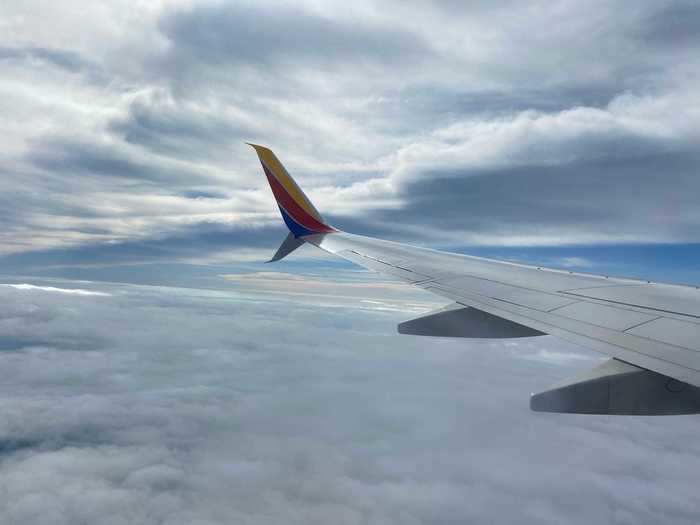
The service was the same, a package of snack mix and a cup of ice water. This flight was only around an hour and a half.
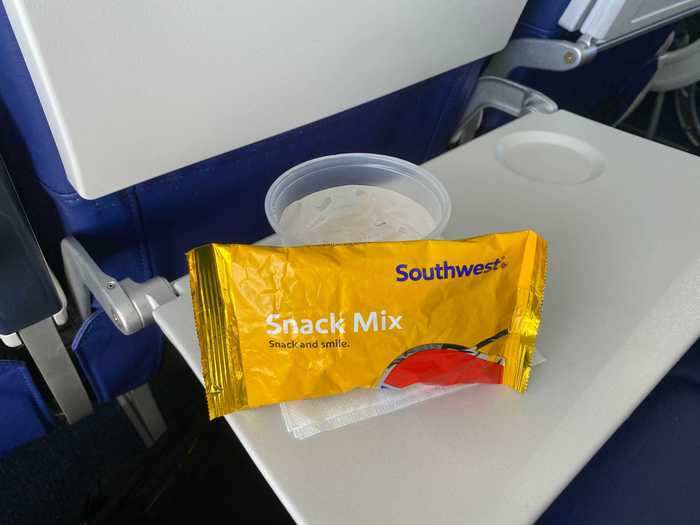
The deplaning experience was also the same, with everybody rushing to get up and off as quickly as possible.
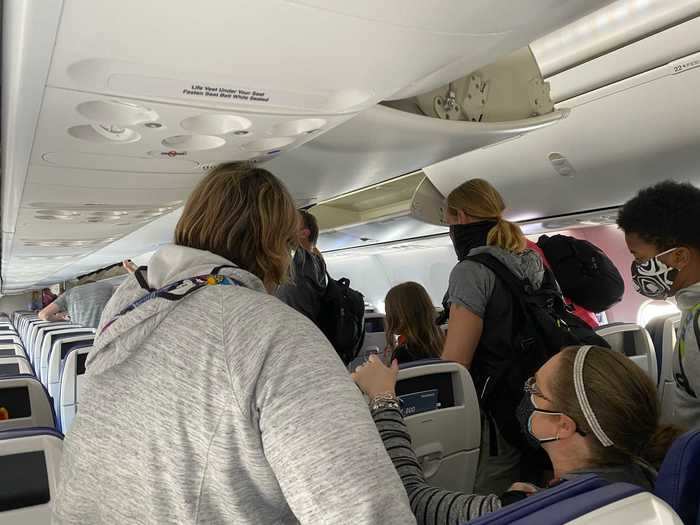
After not leaving the airport due to Florida's quarantine rules for New York visitors, I headed to the United check-in area to prepare for the flight home to New York.

United isn't blocking middle seats but they're not letting passengers select them in advance, prioritizing aisle and windows first. Here's what it said when I went to go pick my seats.
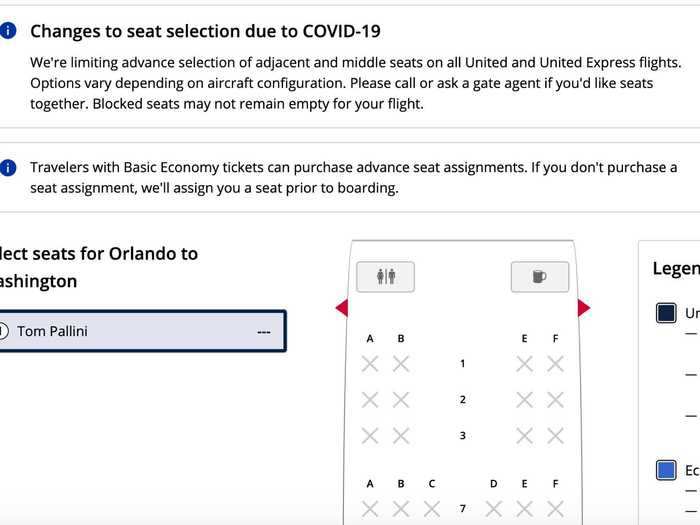
I was also required to accept this health declaration.
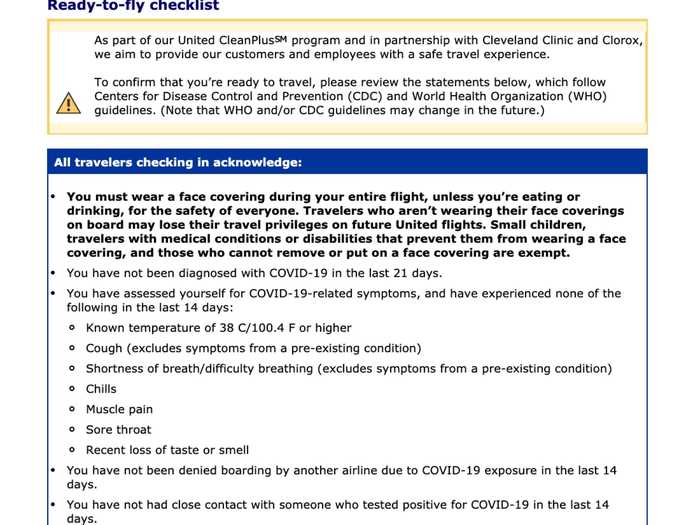
As the flight was over 70% full, a message appeared informing me that the flight would be crowded and I had the option of changing my flight for free.
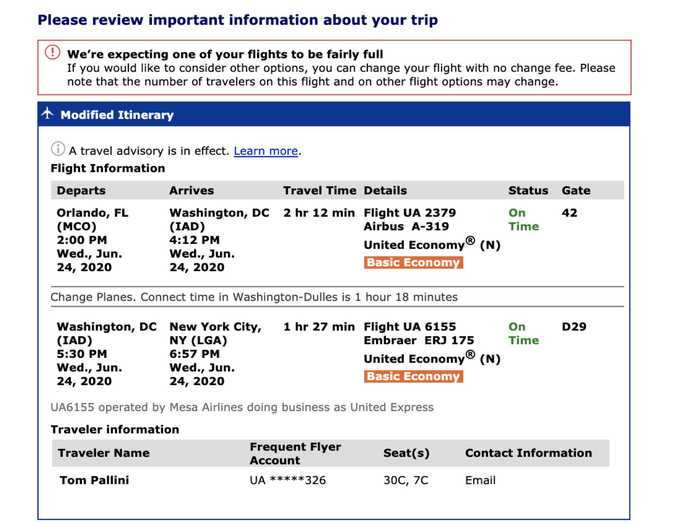
I was given the option to depart from any Orlando area airport and arrive at any New York area airport but there were no flights available until the next day at 3 p.m.
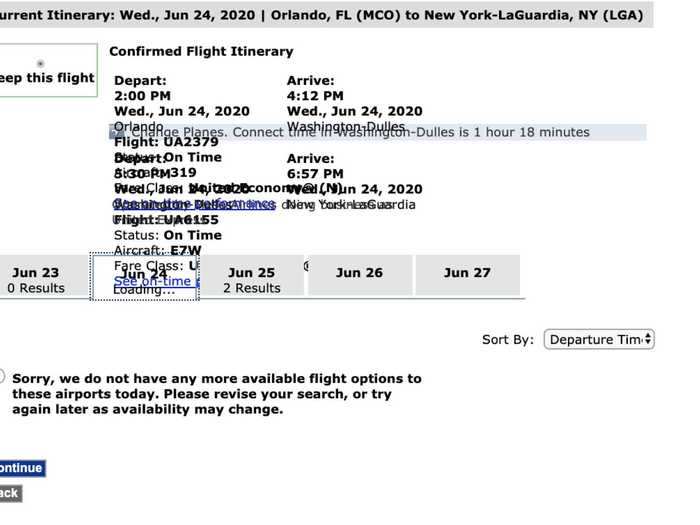
There was some signage in the check-in area asking passengers to social distance and counters featured plexiglass partitions.
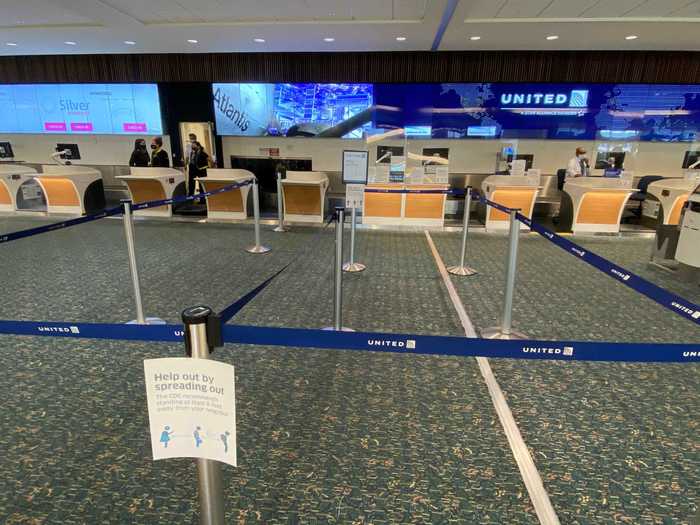
Self-check-in kiosks were also spaced with the middle in a row of three blocked off for use.
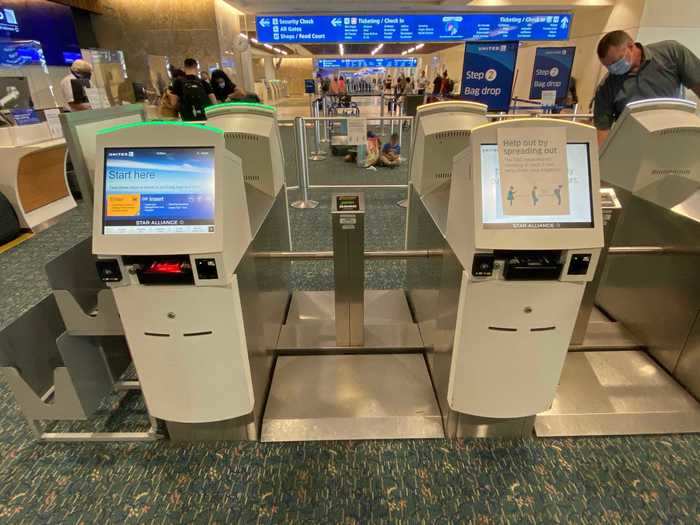
There were also designated kiosks for passengers who had pre-purchased a checked bag allowance, allowing them to print a bag tag only by scanning their mobile boarding pass.

I was once again asked if I wanted to change my flight but no others had opened up. With a lack of alternatives as airlines are cutting back on flights, this gesture felt empty.
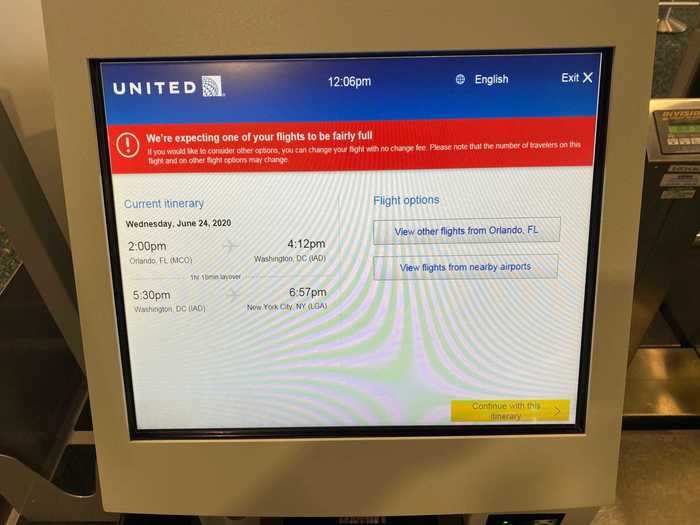
The gate area also featured the partitions separating the passengers and staff.
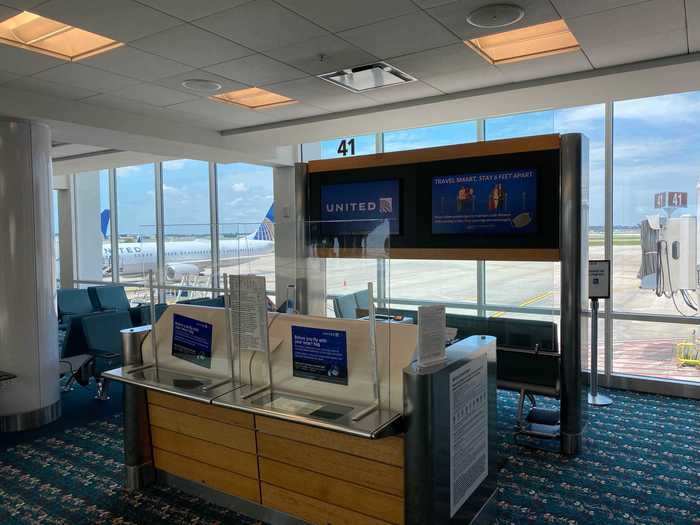
There was also this tiny sign letting passengers know their aircraft was being cleaned to United's new safety standards.
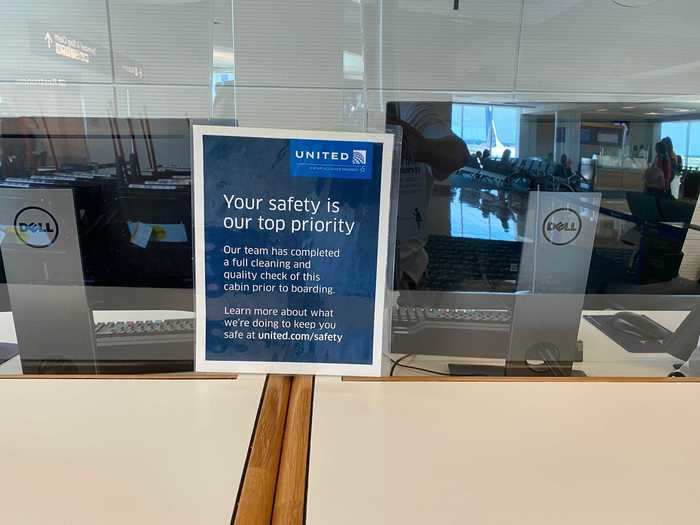
Other than that, though, there was little signage about United's safety policies or protocols at our gate, though agents made some announcements.
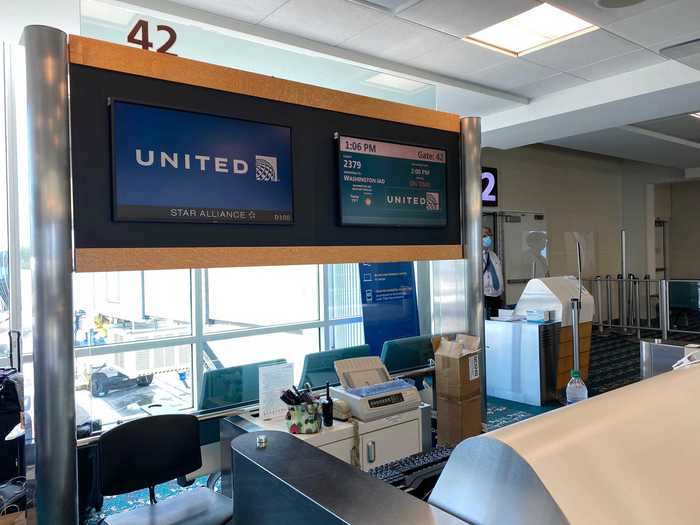
The gate across from ours, however, had some rotating signage like this one. Another display outlined mask requirements on United flights.
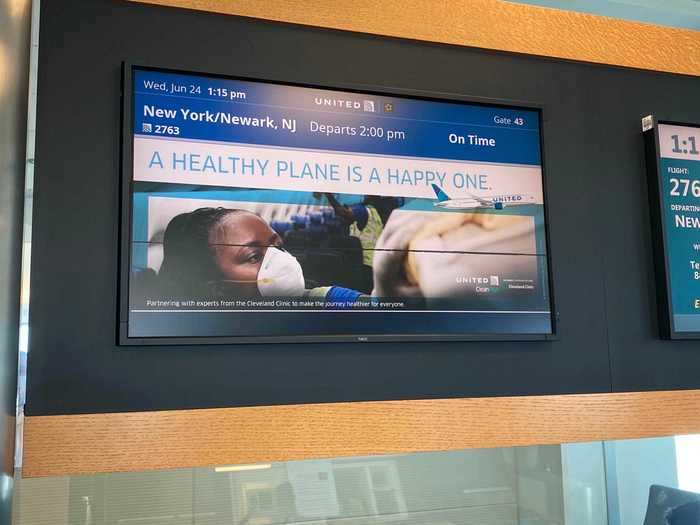
Flyers were asked to scan their own boarding pass at the podium equipped with a passenger-facing scanner and hand sanitizer station. We boarded the aircraft back to front and in groups of five.
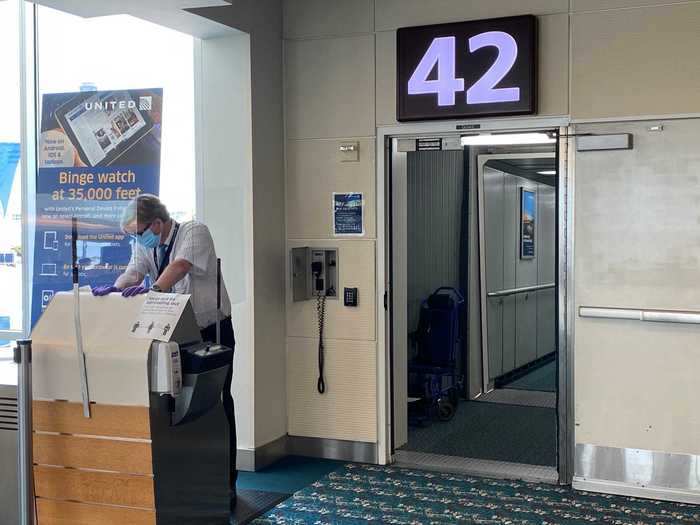
That was, of course, after first class and United elites boarded first. The jetway had no markers or placards reminding people to social distance, though it didn't appear to be a problem.
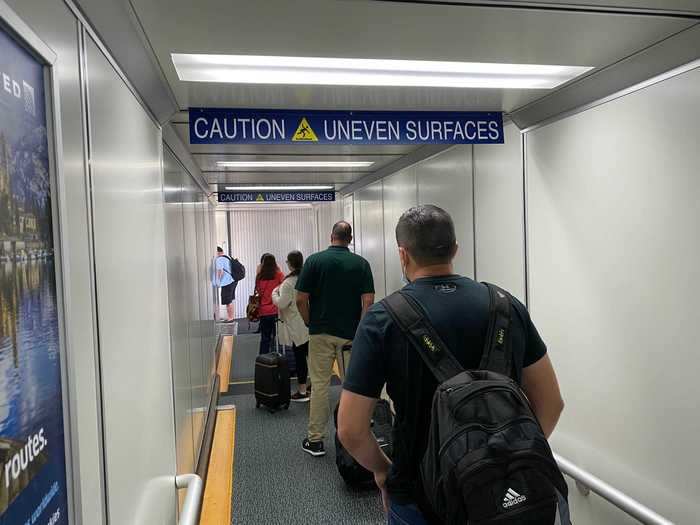
All passengers and cabin crew are required to wear face coverings on United flights.
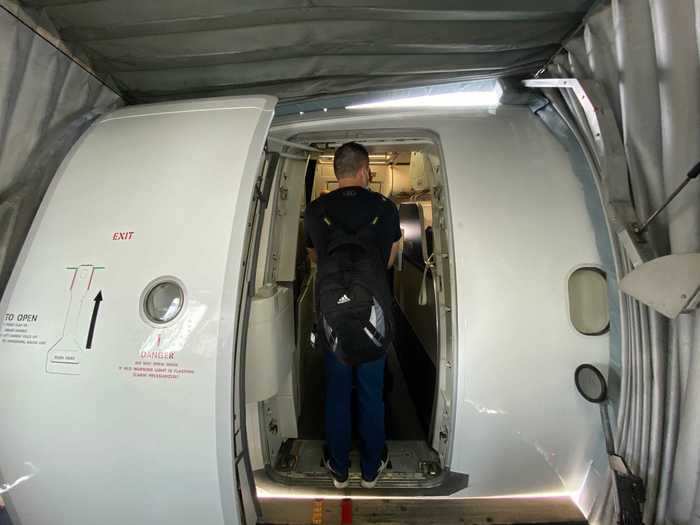
Very few middle seats were occupied and the ones that were seemed to be because families wanted to sit with each other.
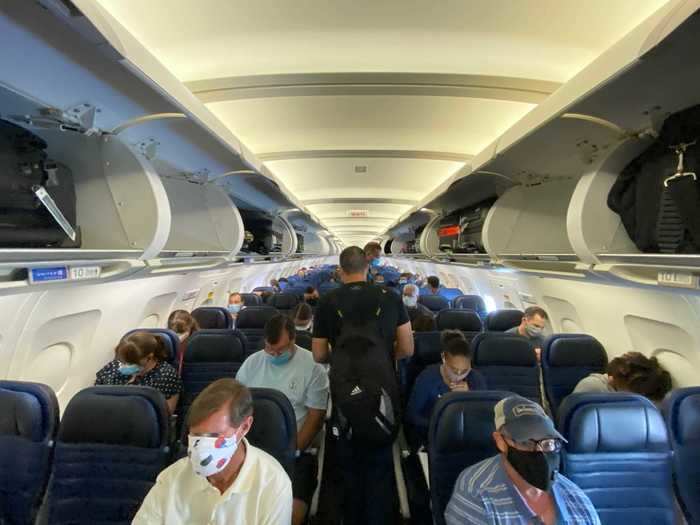
We got lucky the flight wasn't too popular. United wasn't blocking these seats for booking but was limiting non-revenue standby passengers, like airline employees who fly for free, from using them to keep the flight loads down.
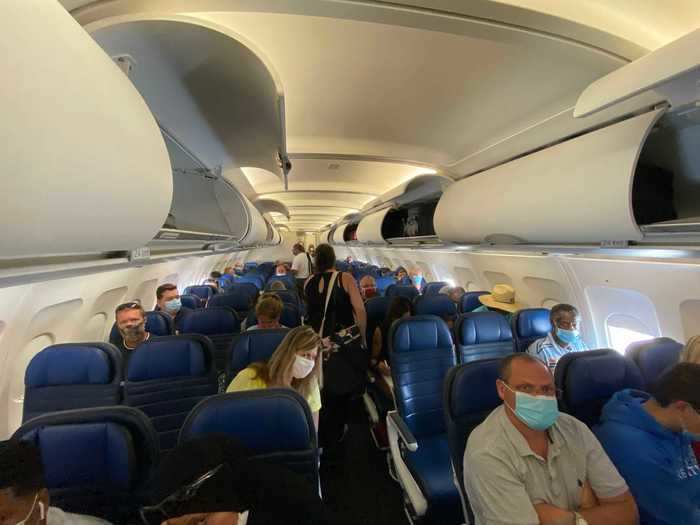
Everybody was given these alcohol pads upon boarding to wipe down seats or sanitize hands.
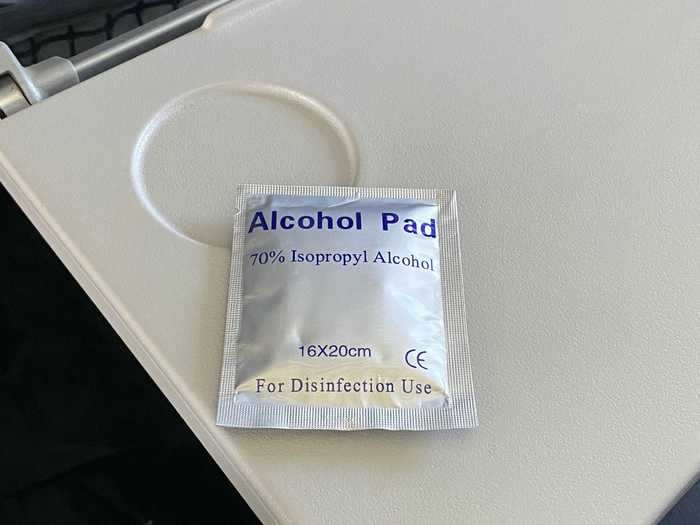
The seat area was already very clean and I didn't notice any issues but the pad did come in handy.
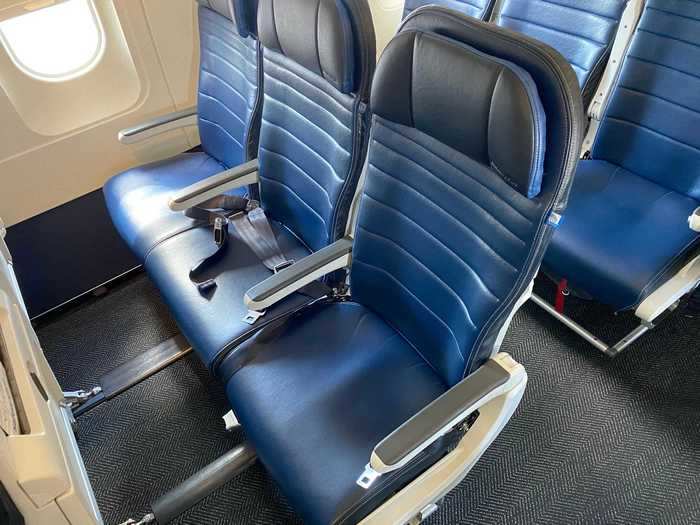
All literature had been removed, just like on Southwest.
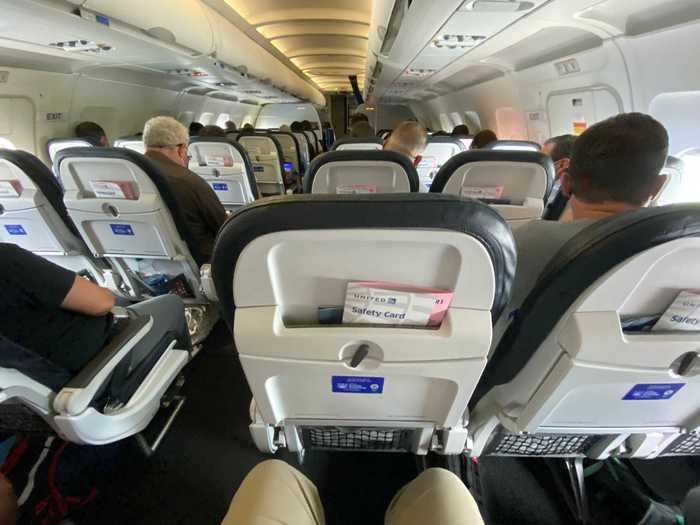
The air vents also proved to be stronger than the ones on Southwest.
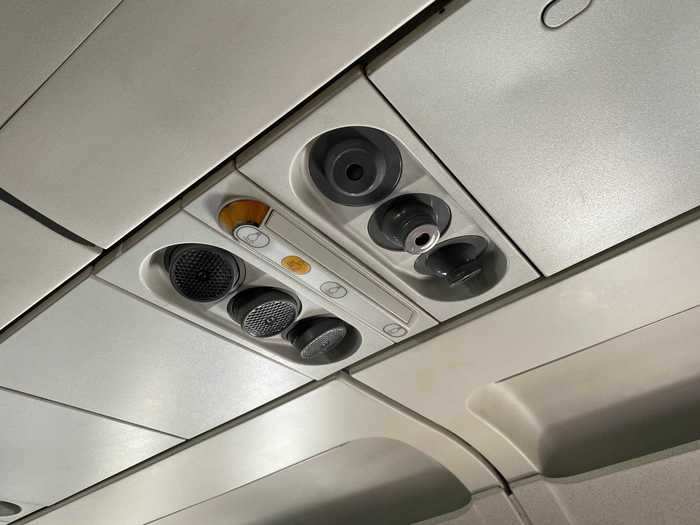
The flight, otherwise, was boring and routine as the in-flight service was suspended and drinks were given on-request. Flight attendants only came around to collect any trash as the gate agents had advised passengers to purchase food and drinks in the terminal.
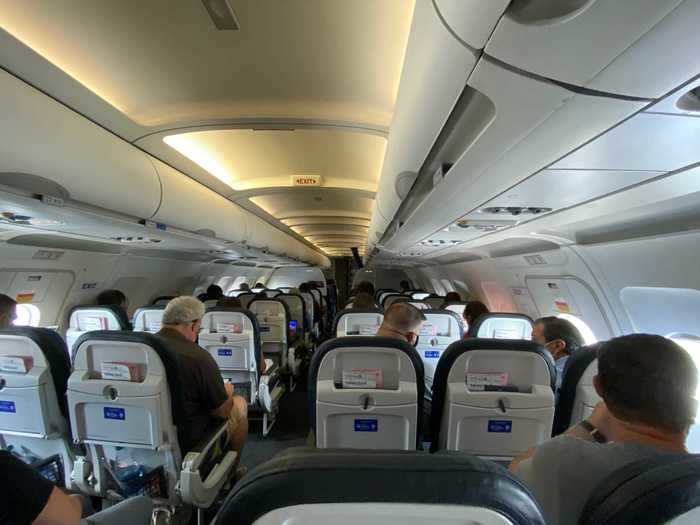
The airport experience was completely opposite in Washington with social distancing signage lining the jetway, spread throughout the terminal, and on nearly every display. Here's one next to the departures and arrivals board.
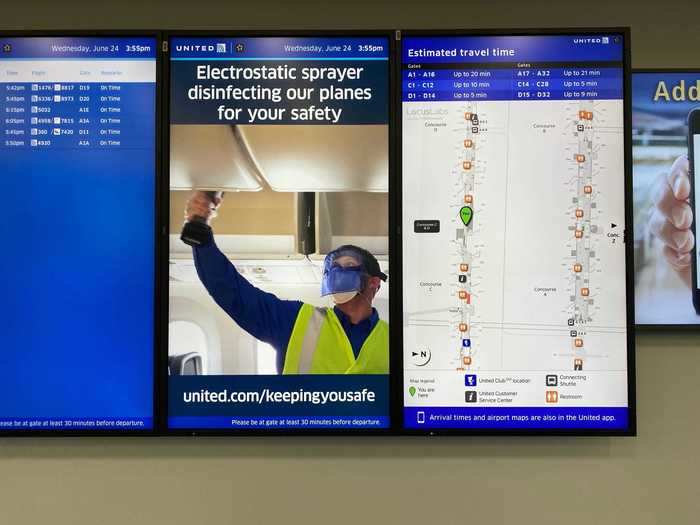
Signs like this covered the terminal. I didn't see any signs like this in Orlando, which isn't a hub but still a popular destination and COVID-19 hotspot.
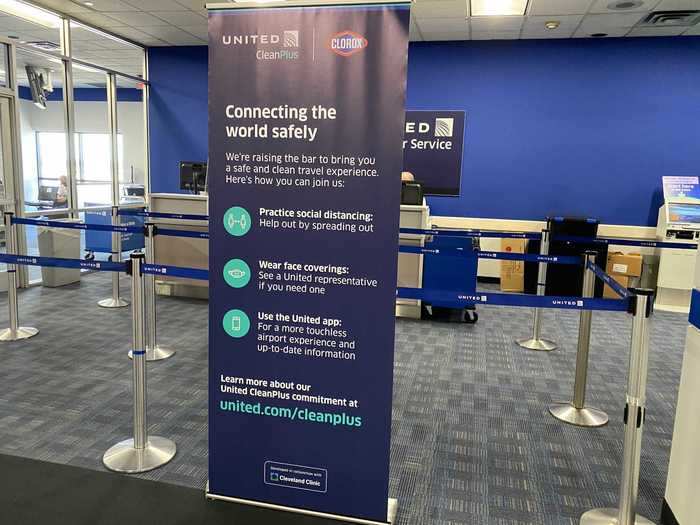
They were also at check-in, unlike in Orlando. United is partnering with Clorox and the Cleveland Clinic to ensure that its planes are cleaned.
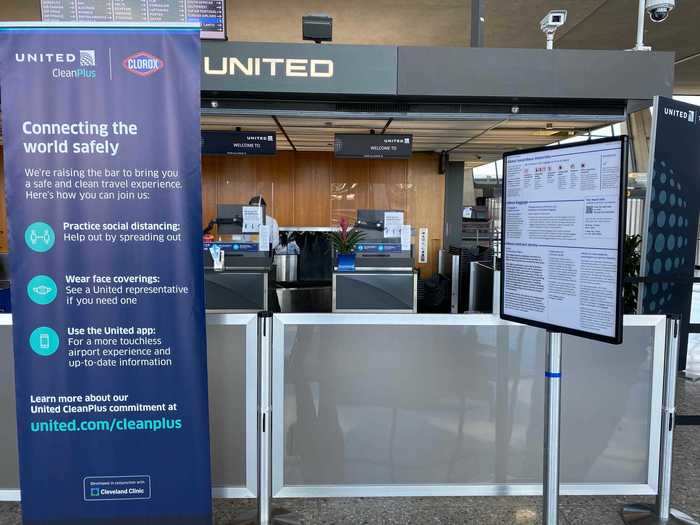
Source: United Airlines
Middle kiosks were also blocked at check-in.
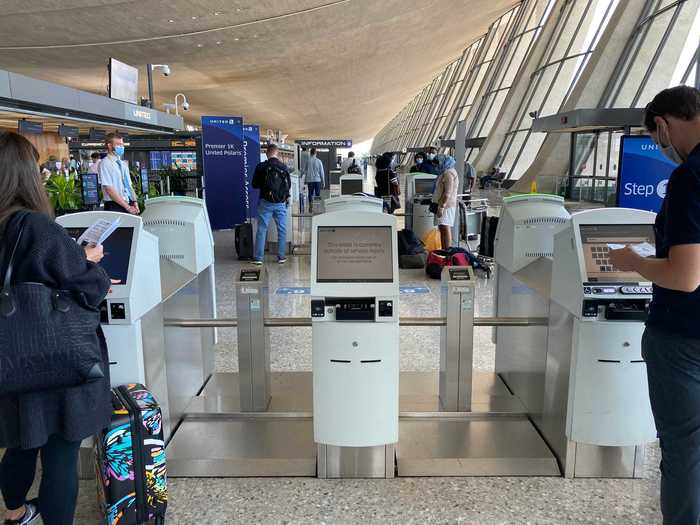
And floor placards reminded passengers to social distance.
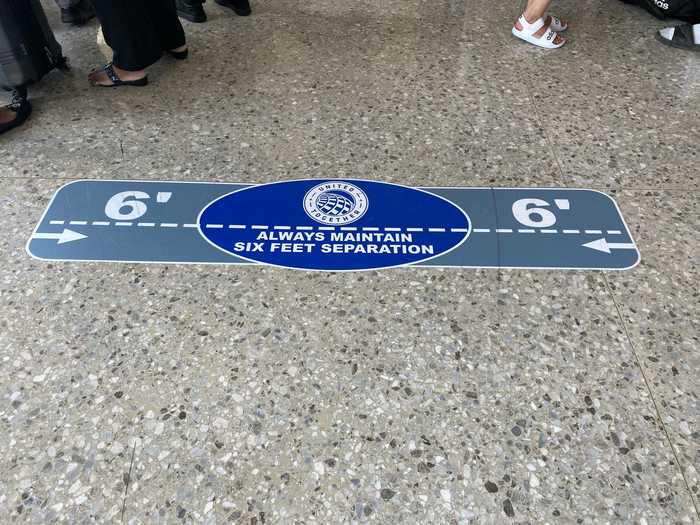
The difference between the signage at the gate for this flight and the one I had just taken was drastic. This is just one example, where United outlines the new boarding procedure.
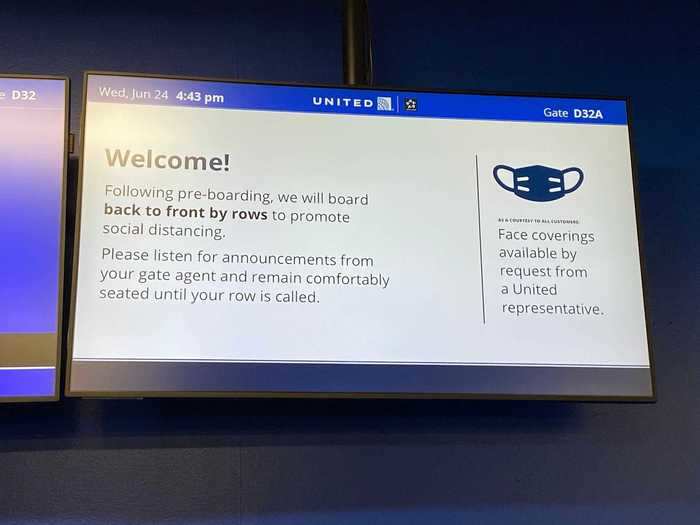
Here's another explaining the new face-covering policy.
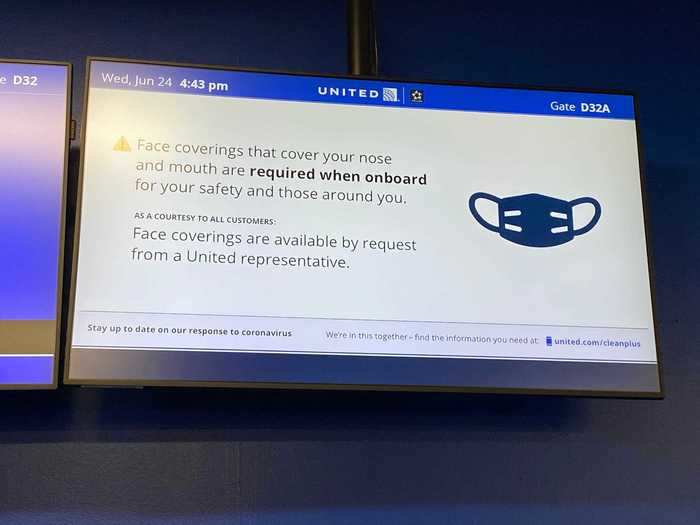
There was also a small video that showed the benefits of HEPA filters onboard and United's electrostatic fogging procedure.
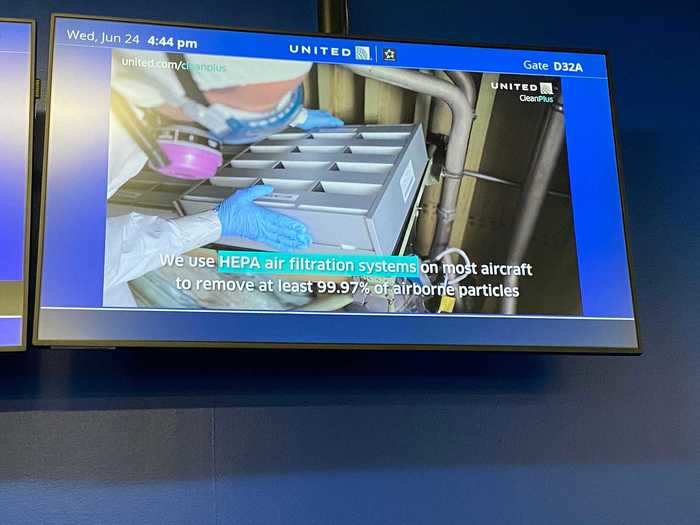
The gates also featured plexiglass partitions, though there was quite a big opening at our gate where the main desktop was.
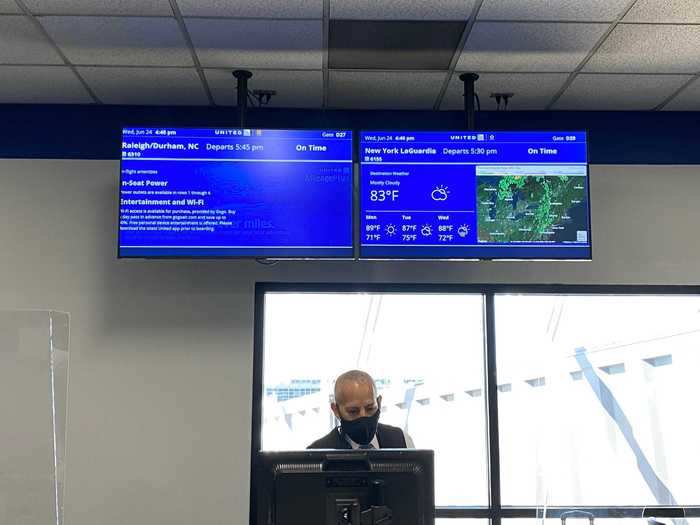
The plane taking us back to New York was an Embraer E175 regional jet with seating in a 2-2 configuration. It was over 70% full so gate agents informed passengers they can take the next flight, which was 24 hours later, for free if they wanted.
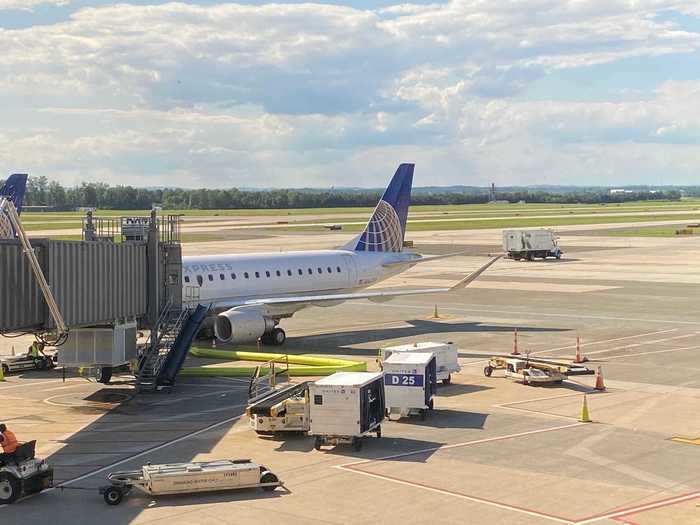
There were no takers so we boarded, again back to front. The jetway was similarly lined with social distancing reminders.
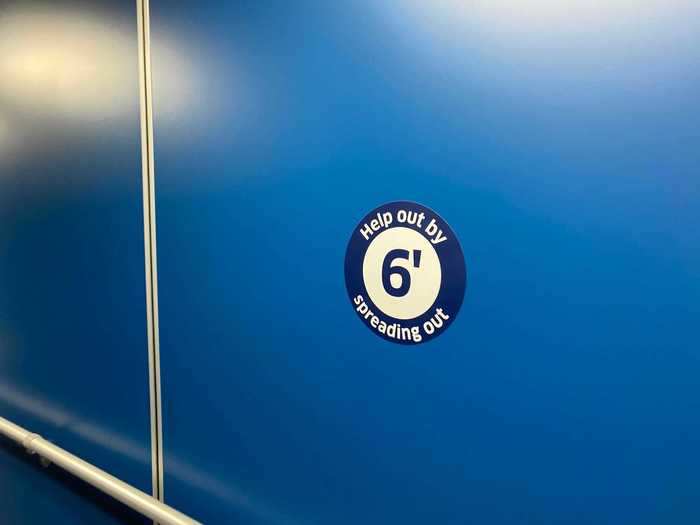
First class wasn't boarded first, this time, but United's highest elites were.
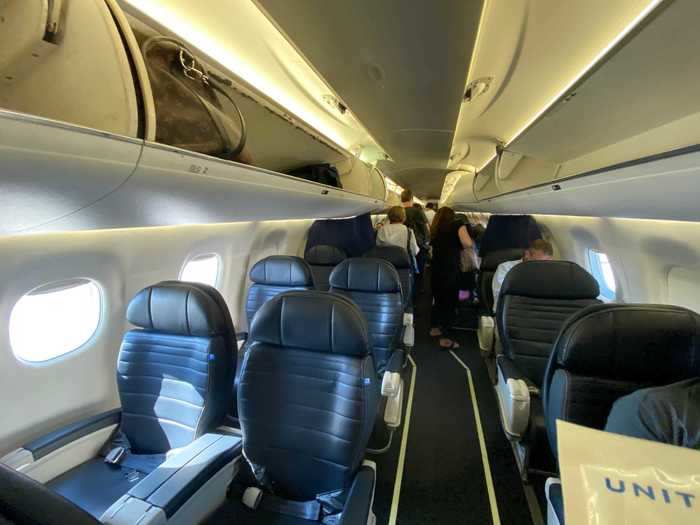
It was a tiny plane and being over 70% full meant that a lot of people would have a seatmate.
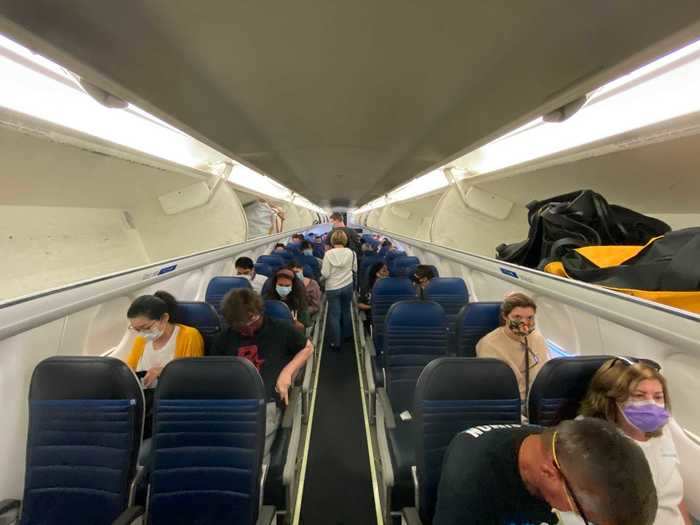
The seats were clean and I found no issues there.
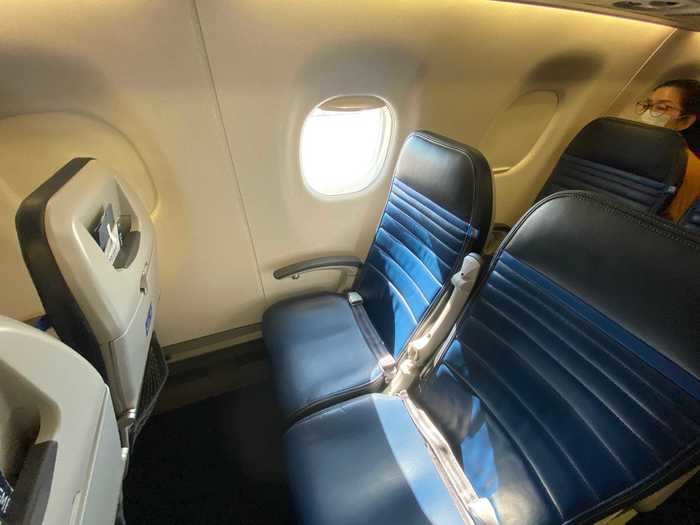
Flight attendants also distributed these sanitary wipes to passengers.
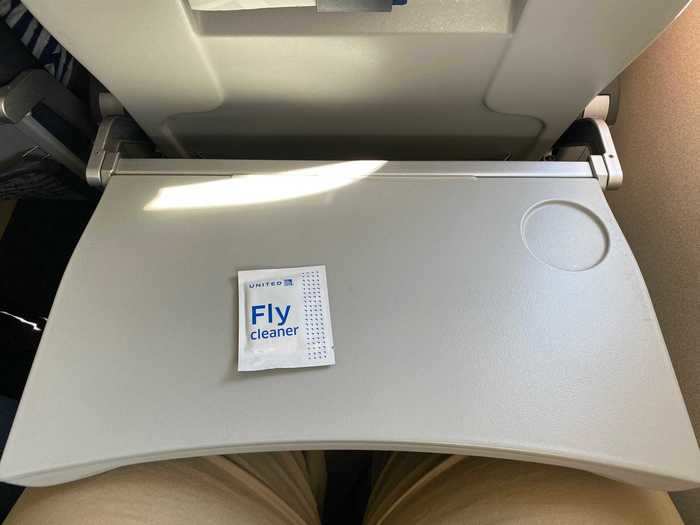
There was absolutely no in-flight service in coach, again, but it was only a 45-minute flight.
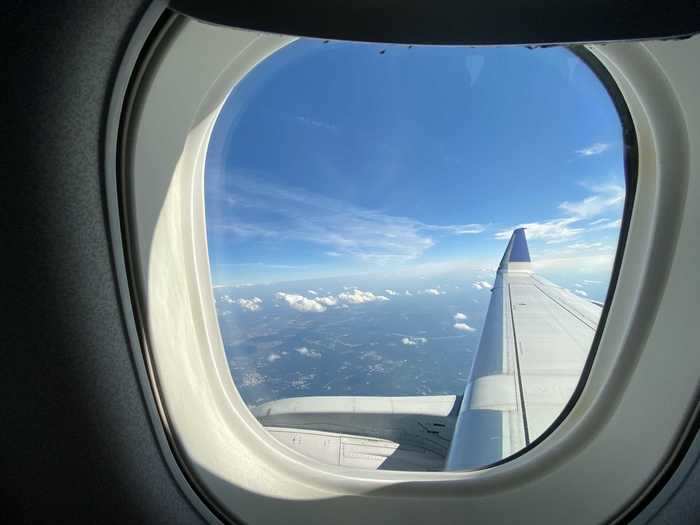
Before I knew it, we were back in New York.
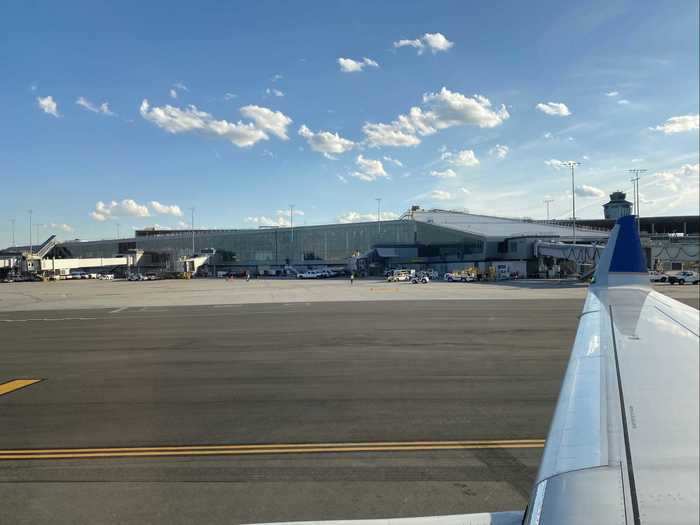
Both carriers lacked consistency when it came to the airport experience. For Southwest, despite having the signage saying that passengers would board in groups of 10 at LaGuardia, we boarded in groups of 30, as opposed to Nashville where agents followed the procedure.
The United airport experience in Orlando was similarly different than in Washington. Orlando had little signage to reassure passengers in contrast to Washington where there was signage everywhere you looked.
Southwest was clearly the winner on the trip, however, for its onboard practices.
Despite not assigning seats, blocking middle seats for booking until September 30 regardless of the demand for the flight shows the airline is committed to giving passengers peace of mind. Both airlines showed a commitment to maintaining high cleaning standards but having the blocked middle goes a long way, especially for those skeptical of flying right now.
I was lucky that my United flight from Orlando to Washington wasn't full enough where the airline had to book middle seats. But the flight from Washington to New York was a different story where I had a seatmate in an already small aircraft.
United does get points for offering free changes for those not wanting to travel but with few backup options, I felt that gesture to be pointless. There simply aren't enough alternatives and no guarantee that the next flight will be emptier.
Southwest also gets a point for offering passengers snacks and drinks, albeit a limited offering. United completely abandoned service but did give passengers a beverage if they asked.
At the very least, both airlines did also provide clean aircraft and at no point was I worried about that aspect.
READ MORE ARTICLES ON
Popular Right Now
Popular Keywords
Advertisement